FEATURE STORY MAP Takes On Its Third CBEMR Training Workshop in Central America

MAP's Community-Based Ecological Mangrove Restoration (CBEMR) program seeks to empower local communities to restore and steward their mangroves while deriving sustainable mangrove-based livelihoods. Involving local communities in mangrove restoration is very important, as it offers participants a sense of empowerment and involvement in resolving their own environmental, social and economic issues of community development. Last month, Mangrove Action Project (MAP), Falls Brook Centre (FBC) and the Honduran group CODA worked together to implement a training program for the restoration of threatened mangrove ecosystems in the region around San Lorenzo in the Gulf of Fonseca, Honduras. Mangrove habitats in the Gulf of Fonseca are threatened by shrimp aquaculture, fishing with explosives, disrupted inland watersheds, agricultural chemical pollution, sugar cane, African oil palm and watermelon production expansion, rising sea levels and new industrial policies. READ MORE
REALTED STORY – Honduran Ramsar site threatened by developers
AFRICA
Shell Agrees to Pay $83.5 Million for Oil Spills

NIGERIA – Oil giant Shell has agreed to pay a Nigerian fishing community about $83.5 million for the worst oil spill ever suffered in Nigeria. The agreement ends a three-year legal battle in Britain over two spills in 2008 that destroyed thousands of acres of mangroves and the fish and shellfish that sustained villagers of the Bodo community in Nigeria's southern Niger Delta. The largest ever out-of-court settlement relating to oil spills in Nigeria is a step forward for the oil-rich Niger Delta region that has been hit by regular environmental damage, but it is tiny compared with the billions in compensation and fines BP had to pay after the Macondo rig disaster in the Gulf of Mexico in 2010. Shell said it is paying $53.1 million to 15,600 fishermen and farmers and $30.4 million to their Bodo community. READ MORE
ASIA
Indonesia and Netherlands launch large coastal safety initiative in Java.

INDONESIA – The Indonesian and Dutch government launched a comprehensive five-year multi million public-private partnership initiative for enhancing coastal safety at the North Coast of Java. It aims to build stable coastlines with reduced erosion risk through a unique integration of mangrove restoration, small scale hard-engineering and sustainable land use. The initiative is financed by the Dutch Sustainable Water Fund and was annouced during a press conference in Jakarta by the Secretary General of the Ministry of Marine Affairs and Fisheries (MMAF), the Secretary of Central Java Province, and the Director of River and Coasts from Ministry of Public Works and Human Housing (PU) and the Dutch Ecoshape Consortium. The authorities are official partners in the initiative. The 5 million euro initiative is the leading international case of the “Building with Nature Innovation Programme”. This public-private partnership aims to stimulate sustainable coastal engineering approaches that make use of the natural protection provided by ecosystems like mangroves and salt marsh habitats. READ MORE
2,000 FISHERS IN KERIAN THREATENED BY SHRIMP FARMING PROJECT
MALAYSIA – The Consumers’ Association of Penang (CAP) urges the Ministry of Agriculture and Agro-Based Industry to investigate and take prompt action to resolve the problem of 2,000 coastal fishers in the Kerian district, Perak whose livelihood has been affected due to the implementation of aquaculture projects in the area. The shrimp farming activities that began 20 years ago have not only destroyed hundreds of hectares of mangroves in the district but also caused marine pollution and threatened fisheries resources in the coastal area in this district. CAP regrets that although the problem has been brought to the attention of the state government, relevant departments and agencies, until now remedial action has yet to be taken. In fact the problem has become more serious. READ MORE
Saving Langkawi’s mangroves
MALAYSIA – HAVING lost 50% of its original rainforest to coastal development in recent years, Langkawi Island’s Unesco Geopark status could change following the United Nations agency’s scheduled review this year. Gathering support from Institute of Foresters Malaysia (IRIM), Malaysian Nature Society (MNS), villagers of Kuala Melaka, Kuala Teriang and the media, Berjaya Langkawi Resort launched the Mangrove 4 Life (M4L) campaign, as part of Berjaya Hotels & Resorts (BHR)’s corporate social responsibility initiative Live & Care. Berjaya Langkawi Resort general manager Chris Niuh said the three-day mangrove conservation campaign was close to their hearts, as it had a direct impact on the surrounding community of the 20-year-old resort. “Villagers of Kampung Kuala Melaka in Kuala Teriang area suffered the worst damage following the 2004 Indian Ocean tsunami, as there was no engineered coastal protection or sufficient mangroves to act as natural coastal defence. READ MORE
Why a power plant is bad news for Krabi

THAILAND – Plans by the Office of Natural Resources and Environmental Policy and Planning (ONREPP) to re-designate parts of coastal community areas in Krabi as an environmental protection zone may sound like a good news for local conservationists. But this is not necessarily so. The area, encompassing Ao Sak, Nua Khlong, Khlong Thom and Koh Lanta districts, is known for its pristine marine ecology that helps put the spot on the world-class tourist map. The re-designation is important given the area is also facing the threat of a coal-fired power plant built by the electricity Generating Authority of Thailand (Egat), and a coal jetty that may compromise not only its beauty but also the way of life of the locals, mostly small-scale fishermen. The controversial power plant which is to be located in Nua Khlong district is strongly opposed by locals. READ MORE
Greens allege destruction of mangroves in city
INDIA – Environmentalists have alleged widespread destruction of mangrove forests near Kochi city. Mangroves along the Container Road linking Kalamassery to the Vallarpadam Island have been severely affected. There have also been instances of burning of mangrove forests near Maradu, said State convenor of the National Alliance of People’s Movement, V.D. Majeendran. He said personnel from the Fire and Rescue Department had to be called in to put out a fire that spread through mangrove forests near the Container Road in early February. M.N. Giri of Kerala Grama Swaraj Foundation said the burning of mangroves was being carried out to allow reclamation of land by the side of the Container Road. He said such activities would affect fisheries resources in the backwaters on both sides of the road. READ MORE
AMERICAS
Honduran Ramsar protected site threatened by developers
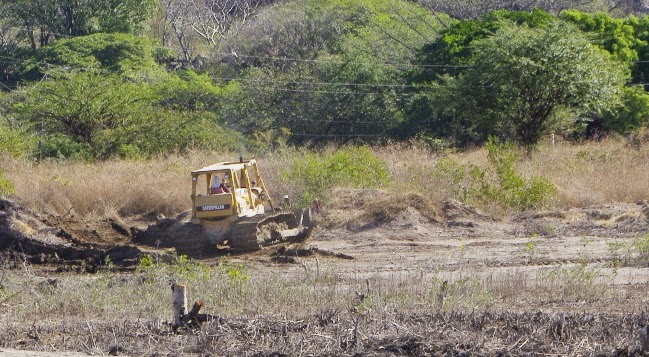
HONDURAS – A team of mangrove restorations experts were shocked to discover a bulldozer clearing mangroves from Ramsar site #1000 in the Gulf of Fonseca in Honduras. The team, led by Mangrove Action Project of the U.S. had made formal requests of the Honduran government to enter the site for purposes of environmental restoration. Upon arriving the team found that the abandoned shrimp farm was being reconstructed in violation of the Ramsar convention. Bulldozers were clearing the little remaining mangroves and constructing dykes to prevent natural tidal flows. The team has written a letter to Ramsar asking for immediate action to protect the site, or a de-listing of the area as it no longer meets the stated intentions of the listing. READ MORE
Crackdown on shrimp imports contaminated with banned antibiotics
USA – New data released by the U.S. Food and Drug Administration (FDA) indicates that of the 114 entry lines of seafood refused in January, 24 were of imported shrimp for reasons related to veterinary drug residues. Nineteen of the entry lines refused for banned antibiotics were of shrimp shipped from Malaysia, four for shrimp shipped from India, and one for shrimp shipped from China, reports the Southern Shrimp Alliance. The Southern Shrimp Alliance has compiled refusal information for shrimp products since 2002 available from the FDA. These data show that the 24 refusals in February, coupled with the 58 refusals in January, mean that 2015 has already had the fourth most refusals of entry lines of shrimp for reasons related to veterinary drug residues since 2002. The report also demonstrates that problems with banned antibiotics in shrimp aquaculture have been limited to a small number of countries. In particular, of the 1,025 entry lines of shrimp refused for reasons related to veterinary drug residues since 2002, over 90% (928) were shipped from just five countries: China, Malaysia, Vietnam, India, and Indonesia. READ MORE LAST WORD(S) FROM OUR BLOG Dear MAP: Marvellous Mangroves curriculum to Bangladeshi schools; It is a good initiative indeed! But, we have to be sure that whether B'desh government is going to include mangrove importance and functions in the school curriculum. If so, how they will be doing it and in which level of school? The another most important point is that who will be resource personnel working on it. Please include the good mangrove scientists on the process. It is very important to have the pure and good write up in Bengali on mangrove ecosystems. Please keep it up. Good concept indeed!Good luck! Dr. Abu Hena M K,
Email: hena71@yahoo.com BACK TO TOP
Not yet a subscriber? Click here to subscribe. Please cut and paste these news alerts/ action alerts on to your own lists and contacts. Help us spread the word and further generate letters of concern, as this can make a big difference in helping to halt a wrongdoing or encourage correct action. | Action Alerts:
FREE MAP Mangrove e-cards CLICK HERE
 MAP’s e-Cards offer you a unique way to spread the word about MAP’s good works, while sharing beautiful photographs of the mangroves Information sheds clear light on shrimp-mangrove connection
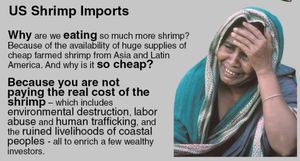
SEE DETAILS MANGROVE/SHRIMPCALLING FOR MANGROVE ART SUBMISSIONS!
A fun and exciting Art Contest for children 6 to 16 years old. We invite all primary school children from tropical and sub-tropical nations, and whose schools are located near mangroves, to create art telling us “why mangroves are important to my community and me?”. Selected winners will be published in a 2016 calendar to be distributed internationally to raise awareness of mangrove forest ecology. READ MORE SHARE MAP'S VISION
CLICK HERE to watch short introductory video. Together we can work "at the roots of the sea". Join us in saving our beautiful country!
We hope you have been following the ongoing battle in Bimini, Bahamas.
We are in need of your help more than ever Click here
Exclusive Interview with Alfredo Quarto, Co-Founder and Executive Director of Mangrove Action Project – See more
MAP VOLUNTEERS NEEDED IN THAILAND VIEW REQUIREMENTS
Order your 2015 Calendar
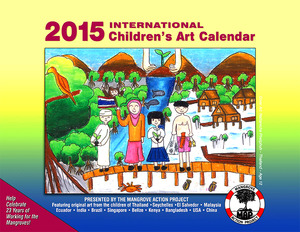
1-20 calendars, $12 each plus shipping
21-49 calendars, $10 ea plus shipping
50-100 calendars, $8 each plus shipping.
Over 100 $7 each plus shipping
Donate to MAP via Paypal
Giving could never be easier  It’s the action, not the fruit of the action, that's important. You have to do the right thing. It may not be in your power, may not be in your time, that there'll be any fruit. But that doesn't mean you stop doing the right thing. You may never know what results come from your action. But if you do nothing, there will be no result. —Mahatma Gandhi It’s the action, not the fruit of the action, that's important. You have to do the right thing. It may not be in your power, may not be in your time, that there'll be any fruit. But that doesn't mean you stop doing the right thing. You may never know what results come from your action. But if you do nothing, there will be no result. —Mahatma Gandhi Green Planet Fundraising Assists MAP – LEARN MORE
MANGROVE ISSUES The importance of restoring mangroves in an effective, long-term manner. Mangrove video – VIEW Please view our new video for our Question Your Shrimp Consumer/Markets Campaign! It is now on our website under the Question Your Shrimp section heading. WATCH VIDEO Mangrove Restoration in Asia – Watch Short Video
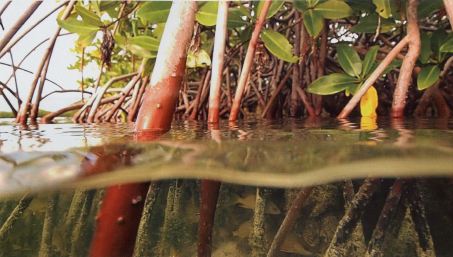
READ A MOSAIC OF LIFE” Peek into the underwater world of mangroves, "womb of the sea." By Liz Cunningham Photos By Wes Matweyew and Liz Cunningham
Marvellous Mangroves MARVELLOUS MANGROVES IN BRAZIL
En Portuges 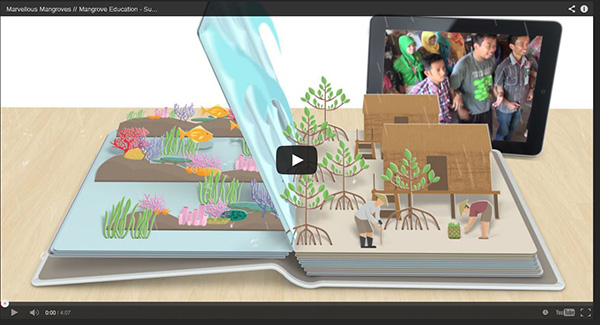
Marvellous Mangroves – A Curriculum-Based Teachers Guide. FOR MORE ON MAPs AWARD WINNING CHINA MANGROVE CURRICULUM VISIT

VIMEO SHOW VISIT OUR "MM" WEBPAGE Check out our presentation for more details on Marvellous Mangroves “Education In The Mangroves" can now be seen on the PhotoPhilanthropy website here! Read this 10 page history of the development of MAP’s educational curriculum VIEW DOCUMENT
Article in Canada's Green Teacher Magazine – Read More
"Question Your Shrimp" Campaign Learn more about the affects of the shrimp industry on mangroves by visiting our blog Editor’s Note: Mangrove Action Project’s Executive Director, Alfredo Quarto was interviewed about shrimp by Green Acre Radio’s Martha Baskin LISTEN TO INTERVIEW
Join MAP on Facebook
Sign the Consumer's Pledge to avoid imported shrimp

Not yet a MAP News subscriber?
Click here to subscribe.
Note to Our Readers:
We strive to keep active links in our newsletter. However, due to circumstances beyond our control, occasionally links to stories may become broken. If you find a link to a story is not functioning, please cut and paste the headline into your browser search bar. In most cases you should be able to locate the original story.
Help Mangrove Action Project through your recycled E-Waste. List of Accepted E-waste Items: Injet Cartidges, Cell Phones, Pagers, GPS, Radar Detectors, Mobile Hot Spots, Calculators, eBook Readers, iPods/MP3 players, Digital/Video Cameras/Camcorders, PDAs, iPads/Tablets/Laptops, Video Game Consoles, Handheld Video Games Visit the Mangrove Action Project recycle website Click on the recycle button then click on the Download Shipping Label, and follow the instructions. 
|











